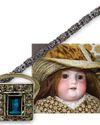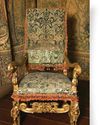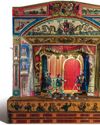
The marriage of flowers and textiles is so longstanding, no one quite knows when the match was made. The visual language of this pairing across embroidery, weaves and printed fabrics offers an alternative relationship with nature, and has things to say about love and eternity. Over centuries, flowers on textiles have shared messages with a personal meaning or been chosen for what they symbolise.
The flowers that a nation adopts for its textiles usually reflect the kinds that grow naturally in that country's climate and environment. In Japan, it's cherry blossom, peony and the chrysanthemum, whose long petals mimicking the sun's rays became associated with royalty. In Chinese textiles, it's the peony again and magnolia held in high regard, together with the lotus flower, symbolising purity. The flower of Persia and the Ottoman Empire was the tulip. Textiles depicting these blooms from Asia began to appear in Mediterranean Europe, by various routes, from the 15th century.
For all European countries, improvements in trade routes throughout the 17th century also brought colourful printed calicoes from India known as 'chintz' to the English and 'indiennes' to the French. They featured a bewildering array of flowers, none of which were recognisable by name.
Esta historia es de la edición June 2023 de Homes & Antiques.
Comience su prueba gratuita de Magzter GOLD de 7 días para acceder a miles de historias premium seleccionadas y a más de 9,000 revistas y periódicos.
Ya eres suscriptor ? Conectar
Esta historia es de la edición June 2023 de Homes & Antiques.
Comience su prueba gratuita de Magzter GOLD de 7 días para acceder a miles de historias premium seleccionadas y a más de 9,000 revistas y periódicos.
Ya eres suscriptor? Conectar

Lisa Coppin
The Cotswold Company’s chief creative officer shares the pieces that mean so much to her

TRAVEL
Six of the best pineta, plus a festive trip to Covent Garden. Review of The Orange, Belgravia by Katie Pike, travel stories

OLD SHEFFIELD PLATE
Stumbled upon by chance, this ingenious material was a more affordable option than solid silver, and well-preserved examples are particularly desirable today

Merrily on high
Summoning servants since the 1700s, bell boards create instant English country-house style (even if you don't have any servants). Emma Longstaff dons her pinny

Let it snow
Nostalgic, magical and highly collectable, snow globes are curious objects of wonder that never fail to instil joy

Velvet Crush
Once the preserve of the wealthy, velvet finally touched all levels of society, thanks to advances in its production process

Celebrating in the Stable
Antiques dealer Julia von Hülsen specialises in Gustavian pieces - all of which look perfectly placed in her German home

THE SHOW MUST GO ON
Victorian toy theatres charming and exquisitely designed miniature worlds have inspired theatre royalty for decades. Today, the tradition is being kept alive by a small but talented network of makers

NICHOLAS LEES
The ceramic artist talks to Dominique Corlett about new ways of working with clay and blurring the edges of solid objects

Candy CHRISTMAS
Pastel hues, vintage decorations and bowls of sweet treats: the festive run-up is gloriously joyful at Bettina Færgeman's historic Copenhagen apartment, where there's an emphasis on entertaining...